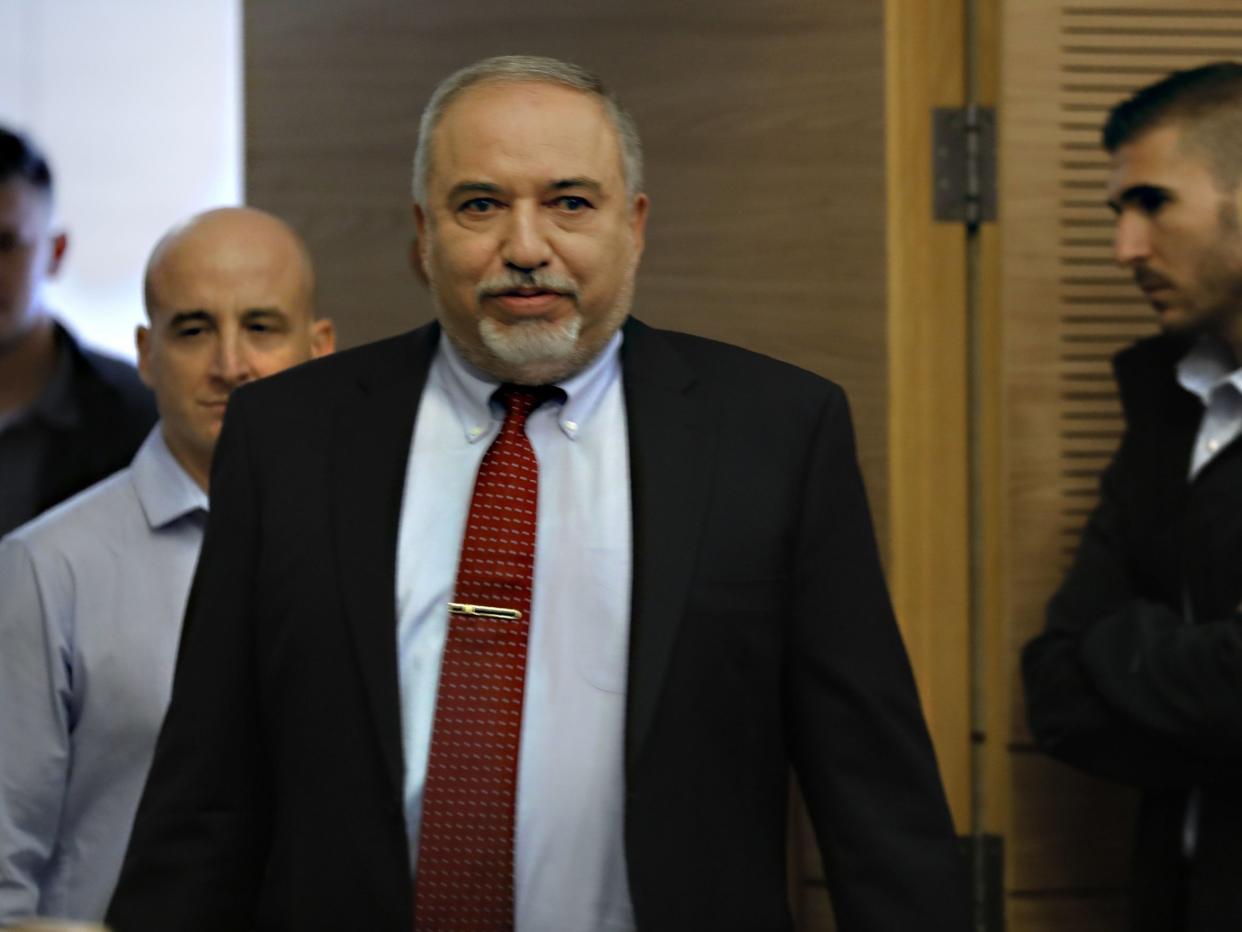Israel defence minister Avigdor Lieberman resigns 'over Gaza ceasefire agreed with Hamas'

Israel’s defence minister Avigdor Lieberman has announced his resignation and called for early elections in protest of a controversial truce with Gaza, plunging the government into turmoil.
Mr Lieberman convened his Yisrael Beiteinu parliamentary faction on Wednesday afternoon to make the statement. He later confirmed his right-wing party would also be leaving prime minister Benjamin Netanyahu’s coalition, leaving it with just a one-seat majority in the Knesset.
Speaking to reporters after the meeting, Mr Lieberman called a ceasefire truce with Gaza a “capitulation to terror” and something he could not stand for.
Militants in the besieged strip announced an Egypt-brokered ceasefire on Tuesday night after pounding Israel with more than 460 rockets and mortars in the heaviest night bombardment since the 2014 war.
Fighting had erupted the day before after a botched Israeli covert operation in south Gaza turned into a firefight, leaving seven Palestinians and an Israeli lieutenant colonel dead.
Israel responded to the rocket fire by striking more than 160 targets in Gaza, sparking fears both sides were on the brink of a new war.
Mr Lieberman said on Wednesday he could not stay in his post while the truce was in place.
“What happened yesterday – the truce combined with the process with Hamas – is capitulating to terror. It has no other meaning,” Mr Lieberman said.
“What we’re doing now as a state is buying short-term quiet, with the price being severe long-term damage to national security,” he added.
Mr Lieberman is believed to be one of four ministers who opposed ending strikes in Gaza during a six-hour security cabinet meeting on Tuesday.
On Wednesday he slammed the military’s response to the rocket fire. “To put it lightly, our response was drastically lacking to the 500 rockets fired at us,” he said.
“We should agree on a date for elections as early as possible,” he added.
Elections are not due until November 2019, but Mr Lieberman’s resignation increases the likelihood of an earlier vote.
Mr Lieberman’s Yisrael Beiteinu party, which holds five seats in the 120-seat Knesset, was a key part of Mr Netanyahu’s coalition, which will limp into an election if it is called early.
The prime minister now has only 61 seats in the Knesset, which is the smallest possible majority.
In the past, Mr Netanyahu has warned that 61-strong coalition would “not be stable”.
He stands to lose even this. The far-right party of Naftali Bennett, the country’s education minister, said if he was not appointed defence minister, it would also quit the coalition, taking with it eight seats.
Yair Lapid, head of the opposition Yesh Atid party, said “the countdown has begun” to the end of Mr Netanyahu’s term in office.
A senior source within Mr Netanyahu’s Likud party warned there was “no need to go to elections at this time of sensitive security”. The source added the defence portfolio would be transferred to the prime minister, giving him sweeping powers.
Mr Netanyahu already holds the positions of foreign minister, prime minister and health minister.
He finally broke his silence on the deal on Wednesday, saying Gaza’s militant Hamas rulers “begged for a ceasefire and they know why”.
“In times of emergency, when making decisions crucial to security, the public can’t always be privy to the considerations that must be hidden from the enemy,” he said at a ceremony on Wednesday morning in honour of Israel’s founding father David Ben-Gurion.
In Gaza, Hamas, the militant group that runs the besieged enclave, celebrated Mr Lieberman’s resignation as “recognition of defeat against Palestinian resistance”.
On Tuesday night, thousands of Hamas supporters took to the streets to revel in the ceasefire that they see as a significant win.
In southern Israel, hundreds gathered in Sderot, which received the worst of the rocket fire, to protest against the end of airstrikes on Hamas positions, warning that a truce would only encourage the militants to strike again.
“Tens of thousands of us have been living through a warzone for 18 years. We are frustrated with the government that has not done anything,” said Stav Cohen, who has lived in the border town her whole life.
“We feel we are not being heard. That not enough is being done for us. That our pain cannot be ignored. We have been left with the financial and emotional ruins. People are traumatised,” she added.
Gaza’s health ministry confirmed that seven Palestinians in Gaza had been killed and 25 wounded by Israeli airstrikes since the cross-border flare-up erupted on Monday.
A barrage of rockets on Israel had killed one person, a 48-year-old West Bank Palestinian man, and injured 27 other others, including three severely.
The Israeli military said on Wednesday a Gaza fisherman – identified locally as Nawaf al-Aatar, 20 – was killed by Israeli fire in north Gaza because he was illegally advancing towards the security fence dividing Gaza and Israel.
Israel and Gaza have fought three wars since 2008 but fears were raised of a fourth amid protests and clashes along the border fence the two sides share.
At least 234 Palestinians in Gaza have since been killed by Israeli fire, the majority during protests and clashes. Two Israeli soldiers have been killed over the same period.

